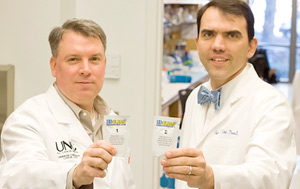UNC Wins TBJ Life Sciences Award for Chemo-Cleaning Wipe
The UNC Eshelman School of Pharmacy received a 2015 BDO Life Sciences Award from the Triangle Business Journal on May 21 in the category of outstanding research university.

The School won for the work of William Zamboni, PharmD, PhD, and Stephen Eckel, PharmD, MHA, in developing wipe kits that detect and remove hazardous residue left on surfaces from the preparation of chemotherapy drugs.
Eckel, a leading expert on the issue of chemotherapy contamination in the workplace, says studies have found that people who prepare and administer chemotherapy drugs are at risk of developing complications from exposure to those drugs. Despite the harmful effects, however, he says the issue has only started to receive more attention in recent years.
“I’ve given talks all over the world on cancer-drug contamination and the risks associated with it for employees, and every time when I walk away, somebody would come up to me and say, ‘I never knew that was a concern,’” says Eckel, a clinical associate in the Division of Practice Advancement and Clinical Education and associate director of pharmacy at UNC Hospitals.
In April 2010, Eckel and Zamboni developed ChemoGLO, an easy-to-use kit and analytical reference lab for measuring surface contamination from five anticancer drugs. In 2011, ChemoGLO was spun out of the School as its own company. In 2013, Eckel and Zamboni introduced Hazardous Drug Clean — or HDClean — a set of towlettes that removes contamination of hazardous drugs on surfaces.
A packet of HDClean contains two towlettes, each saturated with a different mix of chemicals. When used in sequence, the towlettes can remove all detectable anticancer-drug contamination commonly found in places that prepare and administer chemotherapy, such as hospitals, pharmacies, clinics, and labs.
“This contamination is very difficult to clean up because these drugs have very different solubilities,” says Zamboni. “If you use just alcohol or just water, or even a mixture of the two, you can’t clean up the drugs.
“We worked through a bunch of different mixtures and ingredients to come up with towlettes that can clean a wide variety of drugs. We wanted to be able to clean up many different types of drugs, and we didn’t want any strong odor or oily residue. HDClean achieves all of those goals.”
Zamboni an associate professor in the Division of Pharmacotherapy and Experimental Therapeutics and a member of the UNC Lineberger Comprehensive Cancer Center.
Originally published at UNC Eshelman School of Pharmacy News
- Created on .